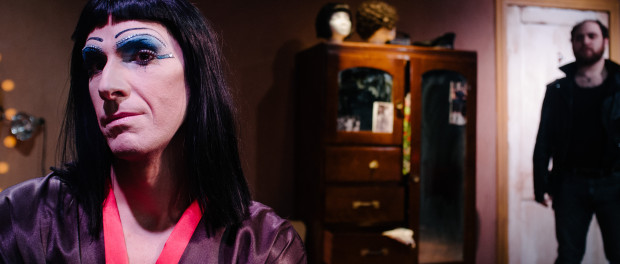Review: Hosanna Identity, Gender, and Sphinxes
Denial just ain't a river in Egypt
Most of the theatre I’ve seen lately seems to be about big stories that take place over long periods of time. Table d’Hote Theatre’s Hosanna directed by Mike Payette concerns a single moment – the humiliation of the bitchiest Queen of Montreal on Halloween – and its aftermath. Yet, in this single event, Michel Tremblay’s play (translated by John Van Burek and Bill Glassco) explicates the complicated emotions related to aging, sexuality, gender, and loyalty.
Initially, I felt as thought I’d landed on another planet. In a run-down apartment lit by a flashing neon Beaubien sign, transvestite Queen Hosanna (Eloi ArchamBaudoin) arrives in her floor length red dress, Egyptian bangs sweeping across a face thick with foundation and blue eyeshadow bedazzled with rhinestones. She paces, fighting to unhook the dress, and spritzes herself with perfume, ranting about a “fat bitch.” Though beautifully dressed as Cleopatra, something has gone horribly awry. Shortly thereafter, her leather-daddy husband of four years, Cuirette (Davide Chiazzese) comes in and a nasty spat ensues.
I don’t think I’m giving too much away when I say that this beautifully structured play gradually reveals the cause of the fight, Hosanna’s humiliation at a party. In the grand scheme thing of things, an embarrassing moment may not seem that important. However, as Tremblay reveals these characters are and how they fit into their community and their city, this humiliating incident takes on epic proportions. In true Tremblay fashion, the most salient information comes about through colloquial dialogue and multi-layered characters, including those mentioned only in name, Sandra, La Duchesse, even Hosanna’s mother. It’s a Tremblay — of course there will be a mother somewhere!
While there are many ways to unravel what makes this play so compelling, and even though Tremblay wrote Hosanna 40 years ago, a pertinent theme people still grapple with today is the entwinement of gender, sex, and identity performance. Hosanna struggles with her identities. Her day-job is as a hairdresser, cutting hair for Jewish ladies, but in her male identity as Claude Lemieux (they wouldn’t trust a woman to do the job). At night, Claude transforms into Hosanna, putting on women’s clothing, perfume, make-up, heels, and all the bitchy she can muster. Her job pays the rent and she is the man of the house. Cuirette, despite his jeans, black tank top, motorcycle and his constant prowling for blowjobs in Parc Lafontaine, cleans, irons, and cooks at home. Of course, this gender blending complicates how the characters perceive their sexuality and gender identity. Cuirette seems to have an easier time understanding his role when Hosanna acts the woman or the man, but less so when she isn’t acting. Even the seemingly self-assured Hosanna is afraid of who she is when the metaphoric make-up is taken off.
The acting in the play is very strong. ArchamBaudoin is riveting as he struts and lounges around in his black stockings and hungrily drags a cigarette to calm his nerves, fixing his hair, fussing in the mirror. Every pose is held with studied refinement. His eyes well with tears until the protective sarcasm returns. His monologue of the incident is perfectly modulated, conducted through gesture and poise as much as word. Chiazzese has a soft touch with Cuirette, letting the soft side of this externally tough and masculine character shine through. His expressive eyes follow Hosanna’s every move with love.
All in all, Tableau d’Hote Theatre’s production of Hosanna is wonderful. The play is a witty but profound meditation on humanity, further enhanced by nuanced acting. The themes are relevant and reveal themselves unexpectedly. The sound and light team enhance moments of the play with music and light techniques to build the drama cinematically.
Hosanna plays at the Mainline Theatre until March 29. $20/$17.50/$15







